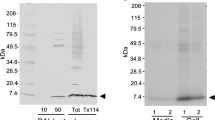Abstract.
Surfactant protein A (SP-A) enhances the uptake of phospholipid by type II cells derived from adult and late gestation fetal rat lung. The present study was performed to examine more fully the developmental biology of the effects of SP-A on phosphatidylcholine (PC) uptake, to determine the effect of SP-A on the cellular location of bound and internalized phospholipid and on the metabolism of internalized phospholipid by morphologically undifferentiated (18-day) and morphologically differentiated (19-day) fetal type II cells. SP-A enhanced uptake almost twofold in a dose-dependent manner in 19-day fetal cells, but it had no effect on uptake by 18-day fetal cells at any concentration. Stimulation of uptake by 19-day fetal cells was saturable at concentrations above 1 μg/ml SP-A. Maximal uptake was 1.12 nmol of PC/mg of protein, and the effective concentration that yields 50% maximal response, KΦ, was 58.9 ng/ml (84.1 pM). The effect of SP-A on uptake by 19-day fetal cells was detectable as early as 1 min of exposure. Uptake correlated significantly with time both in the absence (r= 0.98, p < 0.001) and presence of 5 μg/ml SP-A (r= 0.979, p < 0.001). The rate of uptake in the presence of SP-A (0.019 ± 0.002 nmol of PC/mg of protein/min) was twice the rate of uptake in controls (0.009 ± 0.001 nmol of PC/mg of protein/min). SP-A had no effect on binding to plasma membranes and uptake of phospholipid into lamellar bodies by 18-day fetal cells. On the other hand, SP-A significantly enhanced binding of dipalmitoyl phosphatidylcholine to plasma membranes (two- to threefold) and uptake into lamellar bodies (threefold) of 19-day fetal cells. SP-A caused a significant reduction in the degradation of internalized phospholipid by differentiated fetal type II cells. Based on the lack of effect of exogenous SP-A on 18-day fetal cells, we conclude that the response to SP-A is under developmental control. SP-A enhances the initial binding to the plasma membranes of fetal type II cells and subsequent internalization into the lamellar bodies. This effect is associated with a protection of internalized phospholipid from metabolic degradation. Both of these processes are developmentally regulated during the transition from the canalicular to the saccular phase of lung development.
Similar content being viewed by others
Author information
Authors and Affiliations
Additional information
Accepted for publication: 15 May 1997
Rights and permissions
About this article
Cite this article
Kresch, M., Christian, C. Developmental Regulation of the Effects of Surfactant Protein A on Phospholipid Uptake by Fetal Rat Type II Pneumocytes. Lung 176, 45–61 (1998). https://doi.org/10.1007/PL00007591
Issue Date:
DOI: https://doi.org/10.1007/PL00007591




